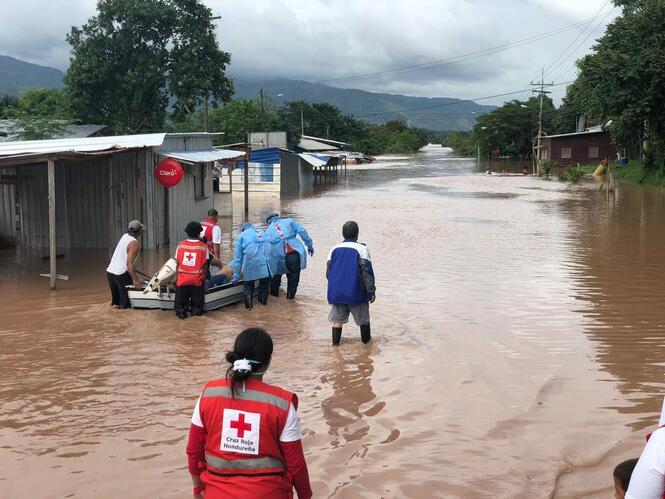
In November 2020, Hurricane Eta and Hurricane Iota directly affected more than four million people in Honduras, severely affecting the livelihoods, health, water, sanitation and hygiene systems of people already facing an economic crisis due to the COVID-19 pandemic.
As the hurricanes tore through the country, the National Congress of Honduras passed a new law to ensure laws and regulations are in place for national and international agencies to better respond to disasters. The new law, entitled “Law for the facilitation of humanitarian assistance in case of disasters and initial recovery”, was adopted by Congress on 11 November 2020 and, subsequently, endorsed by Honduran President Juan Orlando Hernandez on 14 November 2020. The new law will facilitate international humanitarian aid to support the hurricane response and other disasters and crises in the future.
The adoption of the new law follows many years of research and advocacy by Honduran Red Cross. The Honduran Red Cross and community groups have long recognised the vulnerability of Honduras to disasters – in particular, many Hondurans are at risk of losing their livelihoods following a natural disaster such as Hurricanes Eta and Iota. To address this issue, the Honduran Red Cross prepared a legal study of disaster law in Honduras in 2016. The study was used to advocate for a new disaster law – the ‘rules of the road’ in disaster preparedness, response and recovery.
A working group was established, comprising 16 government institutions, the United Nations and civil society organisations. The Honduran Red Cross and the Permanent Contingency Commission (COPECO), with the support of IFRC Disaster Law, began official talks with members of the Government of Honduras to highlight the need to work on a draft bill. At the meeting, a joint commitment was made to integrate a group of experts accompanied by an adviser to the National Congress, who would begin drafting a preliminary bill based on existing disaster law.
In 2017, with technical support from IFRC Disaster Law, the Honduran Red Cross started working closely with the Government of Honduras, drafting a bill to ensure that the necessary laws and regulations are in place for national and international agencies to better respond to disasters.
The new law passed in November 2020 is the culmination of many years of work by Honduran Red Cross, in partnership with Government and with support from IFRC Disaster Law. The new law incorporates key elements of international disaster response law (IDRL) and the IDRL Model Act, a tool developed by IFRC Disaster Law to address the common legal issues relating to international disaster response. It is the first law based on the IDRL Model Act to be adopted in the Americas.
Abner Laitano, Honduran Red Cross Legal Advisor says the approval of the new law is extremely important because there will no longer be restrictions that affect the delivery of humanitarian aid. “Before the law, procedural requirements used to slow the transit and entry of donations in times of national crisis. The approval of the law means that there will be immediate measures to protect human dignity".
Deputy Tamás Zambrano of the Honduras National Congress commented “[t]his [new law] is important for aid to meet the purpose for which it is sent, and for avoiding that it spends months in custom warehouses, without benefit for the affected people who need it".
The Honduran Red Cross continues to work with the Government to develop a new regulation to operationalise the law. The law also institutes an IDRL Group, composed of key government representatives (from the Ministries of Disaster Risk Management, Migration, Foreign Affairs, and Customs, among others), as well as the Honduran Red Cross and IFRC. The IDRL Group is helping to train Red Cross staff and volunteers, and government officials in disaster law.